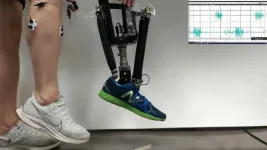(Press-News.org) EMBARGOED FOR RELEASE UNTIL 4 P.M. ET, WEDNESDAY, OCTOBER 18, 2023
MINNEAPOLIS – Having a COVID-19 infection is associated with an increased risk of developing the rare disorder called Guillain-Barré syndrome within the next six weeks, according to a study published in the October 18, 2023, online issue of Neurology®, the medical journal of the American Academy of Neurology. The study also found that people who received the mRNA vaccine from Pfizer-BioNTech were less likely to develop the disorder in the next six weeks than people who did not receive the mRNA vaccine.
Guillain-Barré syndrome is a rare autoimmune disorder in which the immune system attacks nerve cells. Symptoms start with weakness in the hands and feet and may progress to paralysis. Although it can be life-threatening, most people recover with few remaining problems. An exact cause of Guillain-Barré syndrome is unknown but it can occur after gastrointestinal or respiratory infections. Researchers note it occurs in up to 20 out of every one million people per year, and only in extremely rare cases does it follow certain vaccinations.
“These findings further highlight the benefits of ongoing vaccination programs with mRNA-based vaccines,” said study author Anat Arbel, MD, of Lady Davis Carmel Medical Center in Haifa, Israel. “The results have important clinical and public health implications.”
The study involved over 3 million people in Israel with no previous diagnosis of Guillain-Barré. They were followed from January 1, 2021, until June 30, 2022. During that time, 76 people developed Guillain-Barré. Each person with Guillain-Barré was matched to 10 people who did not have the syndrome, or 760 people.
Then researchers looked to see whether participants had a COVID infection or a COVID vaccine during the six weeks prior to the diagnosis of Guillain-Barré or the same time period for their matched participants.
Researchers determined that people with a recent COVID infection were six times more likely to develop Guillain-Barré than those without a recent infection. A total of 12% of the people with Guillain-Barré had a recent COVID infection, compared to 2% of the people who did not have Guillain-Barré.
In addition, 11% of those with Guillain-Barré had a recent vaccination with a mRNA vaccine, compared to 18% of those who did not have Guillain-Barré.
They also found that people with a recent mRNA vaccination were more than 50% less likely to develop Guillain-Barré than those without a recent mRNA vaccination.
“While Guillain-Barré is extremely rare, people should be aware that having a COVID infection can increase their risk of developing the disorder and receiving an mRNA vaccine can decrease their risk,” Arbel said.
A limitation of the study was that since not all participants had tests for COVID, it is possible that some people may have been classified with no evidence of COVID infection when they had an infection with no or mild symptoms.
The study does not prove that COVID infection increases the risk of Guillain-Barré or that mRNA vaccination decreases the risk. It only shows an association.
Learn more about COVID-19 and Guillain-Barré at BrainandLife.org, home of the American Academy of Neurology’s free patient and caregiver magazine focused on the intersection of neurologic disease and brain health. Follow Brain & Life® on Facebook, Twitter and Instagram.
When posting to social media channels about this research, we encourage you to use the hashtags #Neurology and #AANscience.
The American Academy of Neurology is the world’s largest association of neurologists and neuroscience professionals, with over 40,000 members. The AAN is dedicated to promoting the highest quality patient-centered neurologic care. A neurologist is a doctor with specialized training in diagnosing, treating and managing disorders of the brain and nervous system such as Alzheimer’s disease, stroke, migraine, multiple sclerosis, concussion, Parkinson’s disease and epilepsy.
For more information about the American Academy of Neurology, visit AAN.com or find us on Facebook, Twitter, Instagram, LinkedIn and YouTube.
END
Study finds increased risk of Guillain-Barré after COVID-19 infection
Decreased risk found after mRNA vaccine
2023-10-18
ELSE PRESS RELEASES FROM THIS DATE:
Protecting polar bears aim of new and improved radar technology
2023-10-18
Research testing new technology to more effectively locate polar bear dens across the Arctic is showing promising results. Researchers from Simon Fraser University and Brigham Young University (BYU), collaborating with Polar Bears International, hope that improving detection tools to locate dens—which are nearly invisible and buried under snow—will help efforts to protect mother polar bears and their cubs.
Results of a pilot study aimed at improving den location in Churchill, Manitoba—using ARTEMIS Inc., an imaging system that relies on Synthetic Aperture Radar, or SAR—are published this week ...
From one nightmare to another. Anthony Fauci’s new concern
2023-10-18
(WASHINGTON) -- “What keeps you up at night?”
It’s a question Anthony Fauci, MD, heard repeatedly over the course of his nearly four decades as director of the National Institute of Allergy and Infectious Diseases at the National Institutes of Health.
Now a Distinguished University Professor at Georgetown University School of Medicine and the McCourt School of Public Policy, Fauci says he realized his worst nightmare -- a twist on the usual question -- in January 2020 when the type of virus he most feared triggered a worldwide pandemic.
Today, as the COVID-19 pandemic wanes, Fauci describes a new nemesis ...
Robotic prosthetic ankles improve ‘natural’ movement, stability
2023-10-18
Robotic prosthetic ankles that are controlled by nerve impulses allow amputees to move more “naturally,” improving their stability, according to a new study from North Carolina State University and the University of North Carolina at Chapel Hill.
“This work focused on ‘postural control,’ which is surprisingly complicated,” says Helen Huang, corresponding author of the study and the Jackson Family Distinguished Professor in the Joint Department of Biomedical Engineering at NC State and UNC.
“Basically, when we are standing still, ...
New study suggests promising approach for treating pancreatic cancer
2023-10-18
A new study carried out in mice, led by Queen Mary University of London, has identified cells that drive the spread of pancreatic cancer and discovered a weakness in these cells that could be targeted using existing drugs. This offers a promising new approach for treating pancreatic cancer.
The research, published in Science Advances and funded by Barts Charity and Cancer Research UK, found that many patients' pancreatic cancer contains cells called amoeboid cells. These are aggressive, invasive ...
The encounter between Neanderthals and Sapiens as told by their genomes
2023-10-18
About 40,000 years ago, Neanderthals, who had lived for hundreds of thousands of years in the western part of the Eurasian continent, gave way to Homo sapiens, who had arrived from Africa. This replacement was not sudden, and the two species coexisted for a few millennia, resulting in the integration of Neanderthal DNA into the genome of Sapiens. Researchers at the University of Geneva (UNIGE) have analyzed the distribution of the portion of DNA inherited from Neanderthals in the genomes of humans (Homo sapiens) ...
Migrants in Denmark face disparities in care for type 2 diabetes
2023-10-18
A large, population-wide study of Denmark residents with type 2 diabetes shows that migrants typically face a greater risk of inferior care for their disease than native Danes, particularly when it comes to monitoring their disease and controlling biomarkers—managing blood levels of key substances that are associated with diabetes. Anders Aasted Isaksen of Aarhus University and Steno Diabetes Center Aarhus, Denmark, and colleagues present these findings in the open-access journal PLOS Global Public Health.
Prior research ...
Drought conditions expose rivers to hotter water temperatures
2023-10-18
As climate change warms the planet and droughts are anticipated to become more frequent and extreme, a new study reveals how reduced water flows and rising atmospheric temperatures are set to heat our rivers - creating major challenges for aquatic life, ecosystems, and society.
Water temperature is an important control for all the physical, chemical, and biological processes in rivers. It is particularly important for organisms that cannot regulate their own body temperature, such as fish. River temperature is important for human health and industrial, domestic, and recreational ...
The right to be forgotten: ESMO calls on EU countries to ensure equal financial rights for cancer survivors
2023-10-18
ESMO calls on EU member states to adopt a five-year threshold for cancer survivors’ right to be forgotten when transposing the revised EU Consumer Credits Directive to their national legislation
The Society has been selected as one of the key stakeholders involved in the development of the EU Code of Conduct which seekS to ensure that advances in cancer care are reflected in the commercial practices of financial service providers
The ESMO Patient Advocacy Working Group aims to launch a pan-European campaign to illustrate to decision-makers the life-changing impact of a simple ...
Researchers uncover mechanism that links NAD+ to fertility problems
2023-10-18
A woman’s fertility normally decreases by her late 30s with reproductive function eventually ceasing at menopause. It is known that a small molecule called nicotinamide adenine dinucleotide (NAD+) plays a critical role in this decline, and Buck scientists have revealed how this happens and have identified potential new approaches to enhance reproductive longevity.
“Studying ovarian biology and reproductive aging is not just about trying to increase fertility, but really about the overall ...
Study elucidates evolution of mosquitoes and their hosts
2023-10-18
Researchers at North Carolina State University and global collaborators have mapped the mosquito’s tree of life, a major step toward understanding important traits, such as how the insects choose their hosts, feed on blood and spread disease. The findings will help researchers make better predictions to model disease transmission and understand what makes some mosquitoes better disease carriers than others.
The research suggests that mosquito evolution over the past 200 million years mirrors the Earth’s ...
LAST 30 PRESS RELEASES:
Alkali cation effects in electrochemical carbon dioxide reduction
Test platforms for charging wireless cars now fit on a bench
$3 million NIH grant funds national study of Medicare Advantage’s benefit expansion into social supports
Amplified Sciences achieves CAP accreditation for cutting-edge diagnostic lab
Fred Hutch announces 12 recipients of the annual Harold M. Weintraub Graduate Student Award
Native forest litter helps rebuild soil life in post-mining landscapes
Mountain soils in arid regions may emit more greenhouse gas as climate shifts, new study finds
Pairing biochar with other soil amendments could unlock stronger gains in soil health
Why do we get a skip in our step when we’re happy? Thank dopamine
UC Irvine scientists uncover cellular mechanism behind muscle repair
Platform to map living brain noninvasively takes next big step
Stress-testing the Cascadia Subduction Zone reveals variability that could impact how earthquakes spread
We may be underestimating the true carbon cost of northern wildfires
Blood test predicts which bladder cancer patients may safely skip surgery
Kennesaw State's Vijay Anand honored as National Academy of Inventors Senior Member
Recovery from whaling reveals the role of age in Humpback reproduction
Can the canny tick help prevent disease like MS and cancer?
Newcomer children show lower rates of emergency department use for non‑urgent conditions, study finds
Cognitive and neuropsychiatric function in former American football players
From trash to climate tech: rubber gloves find new life as carbon capturers materials
A step towards needed treatments for hantaviruses in new molecular map
Boys are more motivated, while girls are more compassionate?
Study identifies opposing roles for IL6 and IL6R in long-term mortality
AI accurately spots medical disorder from privacy-conscious hand images
Transient Pauli blocking for broadband ultrafast optical switching
Political polarization can spur CO2 emissions, stymie climate action
Researchers develop new strategy for improving inverted perovskite solar cells
Yes! The role of YAP and CTGF as potential therapeutic targets for preventing severe liver disease
Pancreatic cancer may begin hiding from the immune system earlier than we thought
Robotic wing inspired by nature delivers leap in underwater stability
[Press-News.org] Study finds increased risk of Guillain-Barré after COVID-19 infectionDecreased risk found after mRNA vaccine

